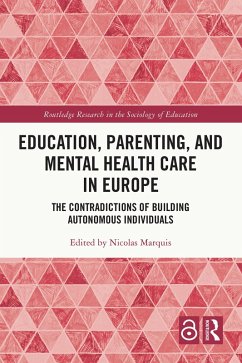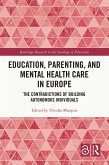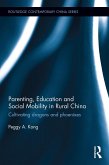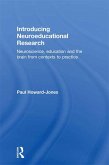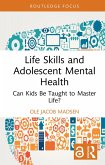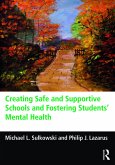Education, Parenting, and Mental Health Care in Europe (eBook, ePUB)
The Contradictions of Building Autonomous Individuals
Redaktion: Marquis, Nicolas
0,00 €
0,00 €
inkl. MwSt.
Sofort per Download lieferbar

0 °P sammeln
0,00 €
Als Download kaufen

0,00 €
inkl. MwSt.
Sofort per Download lieferbar

0 °P sammeln
Jetzt verschenken
Alle Infos zum eBook verschenken
0,00 €
inkl. MwSt.
Sofort per Download lieferbar
Alle Infos zum eBook verschenken

0 °P sammeln
Education, Parenting, and Mental Health Care in Europe (eBook, ePUB)
The Contradictions of Building Autonomous Individuals
Redaktion: Marquis, Nicolas
- Format: ePub
- Merkliste
- Auf die Merkliste
- Bewerten Bewerten
- Teilen
- Produkt teilen
- Produkterinnerung
- Produkterinnerung

Bitte loggen Sie sich zunächst in Ihr Kundenkonto ein oder registrieren Sie sich bei
bücher.de, um das eBook-Abo tolino select nutzen zu können.
Hier können Sie sich einloggen
Hier können Sie sich einloggen
Sie sind bereits eingeloggt. Klicken Sie auf 2. tolino select Abo, um fortzufahren.

Bitte loggen Sie sich zunächst in Ihr Kundenkonto ein oder registrieren Sie sich bei bücher.de, um das eBook-Abo tolino select nutzen zu können.
This edited collection investigates, from a sociological perspective, what it means to create an autonomous individual through a novel exploration of three central fields of sociology: education, mental health care, and parenting.
- Geräte: eReader
- ohne Kopierschutz
- eBook Hilfe
- Größe: 0.79MB
Andere Kunden interessierten sich auch für
![Education, Parenting, and Mental Health Care in Europe (eBook, PDF) Education, Parenting, and Mental Health Care in Europe (eBook, PDF)]() Education, Parenting, and Mental Health Care in Europe (eBook, PDF)0,00 €
Education, Parenting, and Mental Health Care in Europe (eBook, PDF)0,00 €![Parenting, Education, and Social Mobility in Rural China (eBook, ePUB) Parenting, Education, and Social Mobility in Rural China (eBook, ePUB)]() Peggy A. KongParenting, Education, and Social Mobility in Rural China (eBook, ePUB)51,95 €
Peggy A. KongParenting, Education, and Social Mobility in Rural China (eBook, ePUB)51,95 €![Introducing Neuroeducational Research (eBook, ePUB) Introducing Neuroeducational Research (eBook, ePUB)]() Paul Howard JonesIntroducing Neuroeducational Research (eBook, ePUB)39,95 €
Paul Howard JonesIntroducing Neuroeducational Research (eBook, ePUB)39,95 €![Life Skills and Adolescent Mental Health (eBook, ePUB) Life Skills and Adolescent Mental Health (eBook, ePUB)]() Ole Jacob MadsenLife Skills and Adolescent Mental Health (eBook, ePUB)0,00 €
Ole Jacob MadsenLife Skills and Adolescent Mental Health (eBook, ePUB)0,00 €![Creating Safe and Supportive Schools and Fostering Students' Mental Health (eBook, ePUB) Creating Safe and Supportive Schools and Fostering Students' Mental Health (eBook, ePUB)]() Michael L. SulkowskiCreating Safe and Supportive Schools and Fostering Students' Mental Health (eBook, ePUB)100,95 €
Michael L. SulkowskiCreating Safe and Supportive Schools and Fostering Students' Mental Health (eBook, ePUB)100,95 €![Aristotelian Character Education (eBook, ePUB) Aristotelian Character Education (eBook, ePUB)]() Kristján KristjánssonAristotelian Character Education (eBook, ePUB)51,95 €
Kristján KristjánssonAristotelian Character Education (eBook, ePUB)51,95 €![Technologies of Being in Martin Heidegger (eBook, ePUB) Technologies of Being in Martin Heidegger (eBook, ePUB)]() Anna KouppanouTechnologies of Being in Martin Heidegger (eBook, ePUB)47,95 €
Anna KouppanouTechnologies of Being in Martin Heidegger (eBook, ePUB)47,95 €-
-
-
This edited collection investigates, from a sociological perspective, what it means to create an autonomous individual through a novel exploration of three central fields of sociology: education, mental health care, and parenting.
Dieser Download kann aus rechtlichen Gründen nur mit Rechnungsadresse in A, B, BG, CY, CZ, D, DK, EW, E, FIN, F, GR, HR, H, IRL, I, LT, L, LR, M, NL, PL, P, R, S, SLO, SK ausgeliefert werden.
Produktdetails
- Produktdetails
- Verlag: Taylor & Francis eBooks
- Seitenzahl: 248
- Erscheinungstermin: 28. Februar 2024
- Englisch
- ISBN-13: 9781040019528
- Artikelnr.: 70035881
- Verlag: Taylor & Francis eBooks
- Seitenzahl: 248
- Erscheinungstermin: 28. Februar 2024
- Englisch
- ISBN-13: 9781040019528
- Artikelnr.: 70035881
- Herstellerkennzeichnung Die Herstellerinformationen sind derzeit nicht verfügbar.
Nicolas Marquis is an ERC Starting Grantee and Professor in Sociology and Methodology, Université UCLouvain Saint-Louis Brussels, Belgium.
Introduction: Puzzling Autonomy Part 1: Autonomy in the Brain? (Neuro)Cognitive Sciences and Changing Representations of the Child and the Pupil 1. Children as Individuals and Their Disorders in the Ages of Autonomy 2. Cognitive Science and the Building of an "Autonomous Pupil": Scientific Controversies Surrounding Autonomy in the Field of Education 3. Children's Well-Being and Teachers' Benevolence as the Road to Higher Performance?: Cognitive Neuroscience and Montessori in Preschools Part 2: Autonomy Under (Self-)Control?: Social and Emotional (In)Competencies 4. Theorising Strengthened Demands for Social Skills, Emotional Control, and Autonomy 5. Balanced Emotional Expressions: Learning to Be an Autonomous Social Being 6. Parental Coaching and the "Happy Medium" Between Laxism and Authoritarianism: Experts in Common Sense Part 3: Shaping Autonomy Makers?: Paradoxes in Institutional Guidance for Parents and Teachers 7. From Educating Mothers to Neuroparenting: Ideas and Controversies in Parenting Issues 8. Pregnancy After 'a Choice to Drink': Meanings of Autonomy in England's Policies on Fetal Alcohol Spectrum Disorder (FASD) 9. Doing Good Parenthood in Early Childhood Education and Care 10. How Education Demands Autonomy on the Part of Pupils: A Sociological Approach to a Paradox Part 4: Diagnosing the Effects of Autonomy?: Transformations of Mental Health Suffering in Liberal-Individualistic Societies 11. Antidepressant Medication as Identity Construction: And So What? 12. Empowerment, at the Heart of Psychedelic Care: To Be or Not to Be, That Is Not the Question 13. Mental Health, Higher Education and Regulatory Capitalism: Steering not Rowing 14. Voice-Hearers and Highly Sensitive People Reversing the Stigma of Madness: Dissolving, Stating or Valuing the Difference? Afterword: Beyond Autonomy?
Introduction: Puzzling Autonomy Part 1: Autonomy in the Brain? (Neuro)Cognitive Sciences and Changing Representations of the Child and the Pupil 1. Children as Individuals and Their Disorders in the Ages of Autonomy 2. Cognitive Science and the Building of an "Autonomous Pupil": Scientific Controversies Surrounding Autonomy in the Field of Education 3. Children's Well-Being and Teachers' Benevolence as the Road to Higher Performance?: Cognitive Neuroscience and Montessori in Preschools Part 2: Autonomy Under (Self-)Control?: Social and Emotional (In)Competencies 4. Theorising Strengthened Demands for Social Skills, Emotional Control, and Autonomy 5. Balanced Emotional Expressions: Learning to Be an Autonomous Social Being 6. Parental Coaching and the "Happy Medium" Between Laxism and Authoritarianism: Experts in Common Sense Part 3: Shaping Autonomy Makers?: Paradoxes in Institutional Guidance for Parents and Teachers 7. From Educating Mothers to Neuroparenting: Ideas and Controversies in Parenting Issues 8. Pregnancy After 'a Choice to Drink': Meanings of Autonomy in England's Policies on Fetal Alcohol Spectrum Disorder (FASD) 9. Doing Good Parenthood in Early Childhood Education and Care 10. How Education Demands Autonomy on the Part of Pupils: A Sociological Approach to a Paradox Part 4: Diagnosing the Effects of Autonomy?: Transformations of Mental Health Suffering in Liberal-Individualistic Societies 11. Antidepressant Medication as Identity Construction: And So What? 12. Empowerment, at the Heart of Psychedelic Care: To Be or Not to Be, That Is Not the Question 13. Mental Health, Higher Education and Regulatory Capitalism: Steering not Rowing 14. Voice-Hearers and Highly Sensitive People Reversing the Stigma of Madness: Dissolving, Stating or Valuing the Difference? Afterword: Beyond Autonomy?
